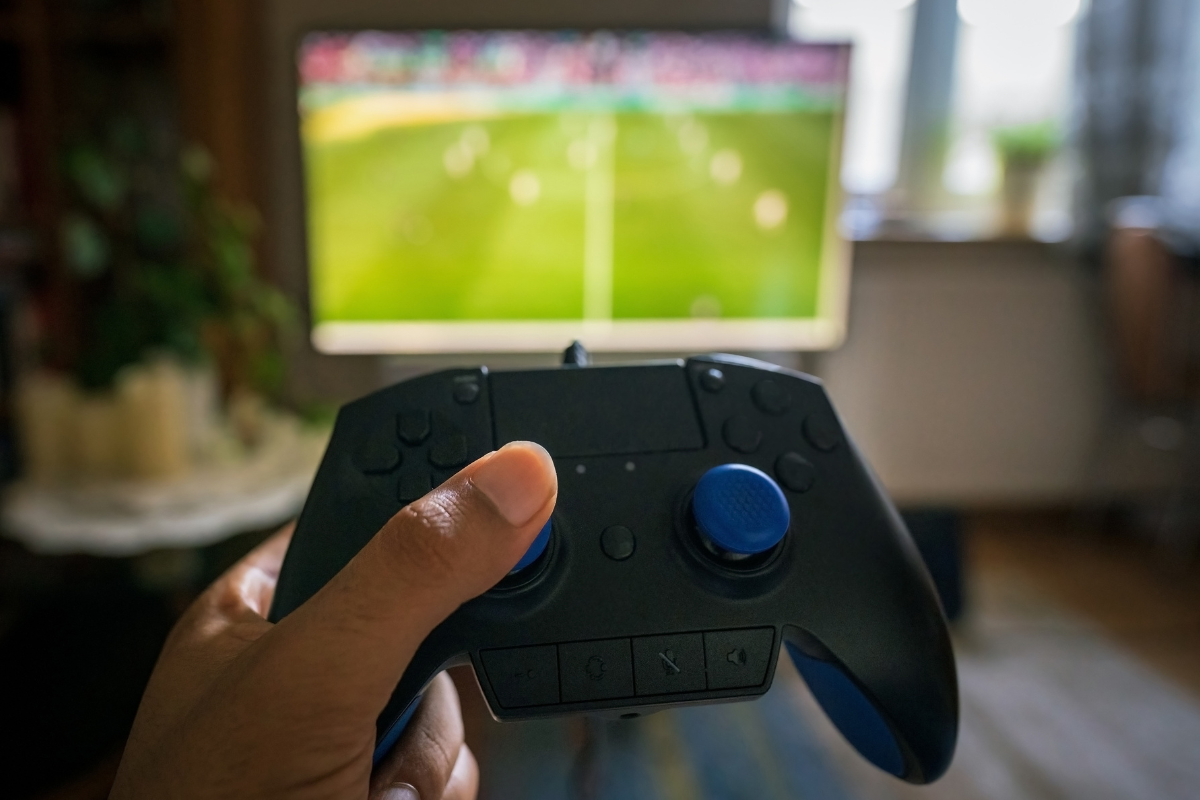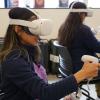
From Video Games to Social Media, How Technology Can Improve Patient Care
The room erupts in applause as the player rolls a strike – his second in a row. But this isn’t a bowling alley. It’s the community room of a local residential care program, and the game is video game bowling.

Heather Leutwyler, PhD, RN, NP, associate professor at the UCSF School of Nursing, studied how group video games impact physical activity among middle-aged and older adults with serious mental illness, like schizophrenia.
“Video games are an accessible and engaging way to encourage physical activity within a supportive environment,” says Leutwyler.
The study is just one example of how UCSF School of Nursing researchers are leading innovative, technology-based projects to promote better health and improve the way people manage long-term medical conditions.
Group Video Games Improve Health of Older Adults Living with Serious Mental Illness
Adults with a serious mental illness die an average of eight to 23 years sooner than people without a mental illness, due primarily to medical conditions like cardiovascular and pulmonary diseases.
They typically have low physical activity levels, which leads to poor health overall, explains Leutwyler.
Her study used Kinect for Xbox, a motion-sensing system in which players control games through physical movement. Over 10 weeks, participants played an active game of their choice – like bowling, tennis or golf – in 50-minute group sessions, three times per week.
The team measured participants’ walking speed, an indicator of cardiorespiratory fitness and premature mortality. They found that group video games improved walking speed.
The games also fostered social connection – an unintended benefit, and one that would prove critically important.
In early 2020, Leutwyler and her team were preparing a new cycle of the video game study – this time exploring video game’s impact on cigarette cessation – when the coronavirus pandemic began. Gathering to play video games indoors was impossible.
Once it was safe to gather outdoors, the team drew inspiration from their video game study and met with participants in parks to play outdoor games like cornhole, bocce ball and Hula Hoop.
Today, Leutwyler is conducting a study on park-based games’ impact on smoking cessation in adults with severe mental illness. The program includes group counseling and individual pharmacotherapy, all conducted outdoors in local parks.
“Society often pushes people with serious mental illness to the margins, but this program brings folks to the community,” says Leutwyler, who adds that she is already observing improvements in participants’ psychiatric symptoms.
Supporting Patients with Cardiovascular Disease, the Leading Cause of Death in the United States
Following a significant cardiac event like a heart attack, patients qualify for cardiac rehabilitation, a program focused on physical activity, mental health and establishing healthy habits like eating well and taking medications correctly.
Although cardiac rehabilitation leads to improved health, only 16% of older adults participate.
“The challenge is getting patients into cardiac rehabilitation and helping patients maintain healthy habits after rehabilitation,” says Linda Park, PhD, NP, FAAN, associate professor.
Park is currently exploring if a mobile application that provides a private social networking group, virtual coaching and text messaging can improve participation in at-home cardiac rehabilitation among veterans, a group that typically completes less than half the recommended rehabilitation sessions.

Another area of opportunity for technology to improve health, says Park, is medication non-adherence which affects more than half of patients with chronic disease. “Missing doses or not taking medications correctly puts heart disease patients for worsening medical conditions, rehospitalization and even death.”
Working with older cardiac patients, Park found that nearly all relied on the same tool to manage medications: a simple, plastic pillbox.
“The pillbox may help with organization, but it doesn’t remind patients to take their medications,” notes Park.
So Park invented Tap iT, an electronic medication adherence system currently under development.
Tap iT combines a mobile application with a pillbox. It alerts patients when they forget doses and allows patients to share data with a designated individual – like a health care professional or family member – to support accountability.
“I hope Tap iT helps patients feel supported and less alone in managing their health,” says Park.
Advancing Cross-Cultural Nursing Through Innovative Technology

Eun-Ok Im, PhD ‘97, MPH, FAAN, School of Nursing alumna, is a pioneer in internet-based research.
In the early 2000s, Im designed the first National Institute of Nursing Research-funded study that used online surveys. It’s hard to imagine not using internet-based surveys in research today, Im explains, but at that time the technology was new, and people were skeptical.
She went on to publish prolifically about internet-based research methodologies, shaping many of the protocols we use today.
Im’s lifelong interest in technology stems from a commitment to advance cross-cultural nursing. “Technology enables researchers to engage ethnic minorities across the nation and the globe,” she says.
Im’s current projects in advancing culturally competent and gender-sensitive care utilize today’s cutting-edge technology: artificial intelligence (AI), virtual reality, web applications and social media.
She received $5.1 million from the National Cancer Institute to develop an AI-based pain management program to address pain and depression in Asian American breast cancer survivors.
To support caregivers of people living with Alzheimer’s disease, Im is developing the first technology-based program that provides information and support specifically tailored to Asian American midlife women who are family caregivers of people living with the disease. The study, funded by the National Institute of Aging, features a web application and virtual reality.
She is also studying the effectiveness of a web application to promote physical activity among Korean American women experiencing depressive symptoms during menopause. The study is funded by the National Institute of Nursing Research and includes virtual coaching, social media and digital education resources – all available in English and Korean.
Although innovative technology is interesting, Im says it’s the desire to help people that drives her. “Using state-of-the-art science, knowledge and technology can meet people’s needs and improve their quality of life.”



